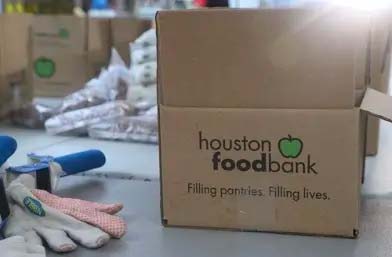Spotlight on Those Decreasing Veteran Food Insecurity…One Nutritious Meal at a Time

Food insufficiency is not a new phenomenon, but it is, unfortunately, very real and very present. The U.S. Department of Veterans Affairs (VA) defines food insufficiency as a lack of access to enough food for a healthy lifestyle. While there are myriad reasons for lack of access to enough food, the VA maintains that food insecurities tend to be higher in households relying on social assistance, single-parent homes, Black and Latinx families, and those people who are homeless.
According to the United States Department of Agriculture (USDA), 10.5% of U.S. households in 2019 were food-insecure. As food insufficiency is affected by both the economy and health, it is not surprising that a number of organizations and public data have reported an increase in the prevalence of food insufficiency in the past year. Specifically, the COVID-19 pandemic continues to pose a major challenge to the financial stability, wellness, and overall health for a growing number of U.S. households and across many demographic classifications—including veterans and their families.
“Veterans sacrifice so much through their service – when they come back home, it’s simply not right that they have trouble getting enough to eat.”
Craig Newmark
Blue Star Families highlighted Food Insufficiency in its 2018 annual Military Family Lifestyle Survey (aMFLS), and reported that 7% of military family respondents and 12% of veteran family respondents indicated someone in their household faced food insecurity in the past year. The 2020 aMFLS found that “fourteen percent of enlisted active-duty family respondents experienced low or very low food security”. Although the topic of food insufficiency is mentioned discreetly as a concern to veteran families, the argument could be made that its persistence may be somehow related to the stresses inherent with top veteran concerns reported in the same survey, such as military pay, benefits, and health care challenges.
Fortunately, there have been and continue to be organizations willing to step up and step in to assist veterans and their families to more effectively access reliable and sufficient quantities of affordable, nutritious food.

Craig Newmark, founder of Craigslist and CEO of the Craig Newmark Foundation, understands the veteran challenges. “Veterans sacrifice so much through their service – when they come back home, it’s simply not right that they have trouble getting enough to eat,” he said when he announced his $3M donation to the Bob Woodruff Foundation’s nationwide efforts to combat food insecurity in America. This donation to the Bob Woodruff Foundation (BWF) in November 2020 enabled those programs across the country that work to reduce food insecurity for veterans and their families to be better identified and supported. In fact, Craig Newmark Philanthropies has shined the light on this food insufficiency as not only a challenge, but a call to action for which we all can roll up our sleeves, work now to improve veteran and family access to good and abundant food, and to ensure our veteran heroes and their families thrive now and in years to come.
The Bob Woodruff Foundation is using donations of time, talent, and money to assisting veterans with food. Houston Food Bank and Capital Area Food Bank are just two of the recipients of grants from the Bob Woodruff Foundation who have put in motion programs to help eliminate food insufficiency in their communities—right now and as an investment in communities for the future.
Founded in 1982, the Houston Food Bank is a certified member of Feeding America. Through its network of 1,500 community partners, the Houston Food Bank distributes food and other essentials, such as fresh produce, meat, and nonperishables to those in need. The organization also prepares nutritious hot meals for kids and provides a number of life skill educational programs to help families achieve long-term stability. “At the end of the day none of us can live if we can’t eat,” Lytrenda Moore, Innovation and Special Projects Supervisor at the Houston Food Pantry told the Bob Woodruff Foundation.

By any measure, these efforts are impressive. But even more amazing is the impact. In 2020, the Houston Food Bank fed 92,835 families per week. Within its distribution area across eighteen Texan counties, it delivered 159 million nutritious meals, including those to veteran families. “We have been working with the veteran population for a long time at Houston Food Bank,” Mayra Loera, Capacity and Operations Manager at HFB said. “It is such an underserved population. It is gut-wrenching to come back after service and not have the support you deserve. It should be a right.”
Another recipient of a grant from the Bob Woodruff Foundation, the Capital Area Food Bank provides food to people throughout D.C., Maryland, and Virginia—an area that has seen a near 50% increase in food insecurity rates since the beginning of the pandemic. Through both direct distribution and partnerships with hundreds of other non-profit food assistance organizations – several of which serve the unique needs of the region’s military and veteran communities—Capital Area Food Bank provided the food for 63 million meals over the last year. No small feat, and one that takes an extraordinary amount of organization and dedication to stay the course. The food bank also operates a number of programs that work to address the root causes of food insecurity by pairing food with other critical services through partnerships with other organizations.
As our nation marks over a year of navigating the overwhelming COVID-19 threat, it is heartening to know that these, and many other great organizations—DC Central Kitchen, FareStart, Feeding America, God’s Love We Deliver, and World Central Kitchen just to name a few—have continued their services to veterans and their families despite the inherent challenges to food distribution and widespread education efforts during a pandemic.
The Bob Woodruff Foundation celebrates those who donate their time, money, and efforts in community organizations working tirelessly to avail food resources to our cherished veteran and family population. Reducing food insufficiency remains a persistent challenge that truly takes a community to solve and as such, it definitely remains one of our country’s most pressing (and important) calls to action.
Stay posted for future updates on our Bob Woodruff Foundation partners’ successes as together we tackle food insufficiency.
Dr. Paula Smith is a grateful mom, Retired Army Soldier, Veteran, and writer. She earned her Doctorate and master’s degrees in Physical Therapy, her undergraduate degree in Communications, and numerous professional certificates for business development and management to include process improvement, project management, and non-profit executive management. Her passions include leading, mentoring, laughing, keeping up with her three active kids, and breathing in that energizing beach air at her home on Cape Cod. Paula also operates P.S. Get It Write! at www.psgetitwrite.com









